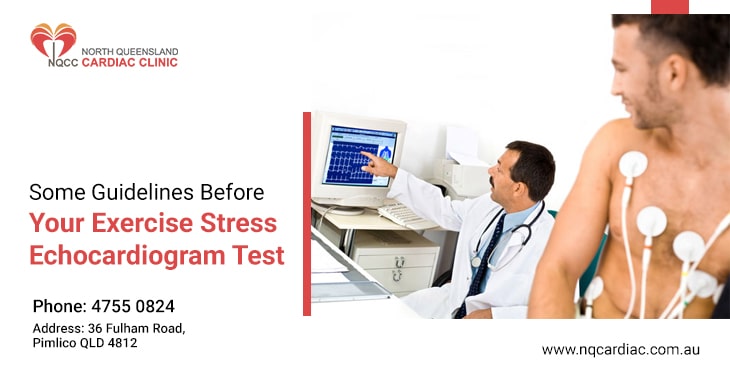At North Queensland Cardiac Clinic, we understand the importance of comprehensive cardiac assessments to ensure your heart’s health. An Exercise Stress Echocardiogram Test Pimlico (also known as a stress echo) is a valuable diagnostic tool used to assess the function of your heart during physical activity. This non-invasive test helps our experts detect any potential heart conditions that may not be apparent during rest. Before your test, here are some essential guidelines to ensure a safe and successful Exercise Stress Echocardiogram Test Pimlico.
- Consultation with Your Doctor
- Fasting Before the Test
- Medication Guidelines
- Clothing Choice
- Hydration Matters
- No Caffeine or Nicotine Before the Test
- Physical Activity Prior to the Test
1. Consultation with Your Doctor:
Before scheduling an Exercise Stress Test, it is crucial to consult with your primary care cardiologist. They know your medical history, helping them assess your current health status, and determine if the stress echo suits your condition. If you have any existing medical conditions or are taking medications, your doctor must be aware to make necessary adjustments during the test.
2. Fasting Before the Test:
To achieve accurate results, it is recommended to fast for at least two to four hours before the stress echo. This means abstaining from food and beverages (except water) during fasting. Fasting helps minimize the chances of experiencing discomfort or nausea while exercising and improves the quality of the echocardiogram images.
3. Medication Guidelines:
If you are taking prescription medications, consult your doctor about whether you should continue taking them before the test. Sometimes, you may need to hold off on certain medications, such as beta-blockers or heart rate-lowering drugs, as they can interfere with the stress echo’s objectives. However, never stop or adjust your medications without your doctor’s approval.
4. Clothing Choice:
Wearing appropriate clothing can greatly impact your comfort during the exercise stress echocardiogram. Choose loose-fitting, comfortable attire and supportive athletic shoes. Avoid wearing dresses, skirts, or tight clothing that may restrict your movement. Additionally, bring warm clothing, such as a jacket or sweater, as the examination room may be cooler.
5. Hydration Matters:
Staying hydrated is essential for overall health, but be cautious about drinking large quantities of fluids before the Exercise Stress Test. While drinking water is generally allowed, excessive consumption just before the exam may lead to discomfort during exercise. Moderation is key.
6. No Caffeine or Nicotine Before the Test:
Caffeine and nicotine can increase heart rate and blood pressure, potentially affecting the accuracy of the stress echo results. It is advised to avoid caffeine-containing beverages like coffee, tea, and energy drinks on the test day. Additionally, refrain from using tobacco products before and during the examination.
7. Physical Activity Prior to the Test:
Avoid vigorous or strenuous physical activity on your Exercise Stress Test day. Exerting yourself before the test may impact the test results or lead to premature fatigue during the examination. It’s best to conserve your energy for the actual stress test.
Conclusion
The Exercise Stress Echocardiogram Test Pimlico is a valuable diagnostic tool that provides vital information about your heart’s health during physical activity. Following these guidelines and consulting with your healthcare provider can ensure a safe and effective stress echo, helping us detect any underlying heart conditions and providing you with the best possible care at North Queensland Cardiac Clinic.


